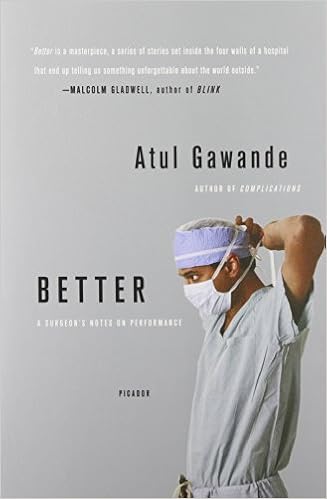 |
| Image via Amazon.com |
I am heading into the second year of my grad program in school leadership (read: Administration). We were asked to read Atul Gawande's Better: A Surgeon’s Notes on Performance. After everything I have been through over the last 3 years including weight loss surgery and the ensuing massive weight loss, thyroid cancer, vocal cord paralysis and surgery to help the paralysis, and surprise gall stones that led to numerous medical challenges between Thanksgiving and the end of the school year- and lots of trips to the ER and yet one more surgery...it was a difficult book for me to read. However, it left me with lots of ideas and thinking about systems, methods, and how to do things better.
There were so many moments that stood out:
“We want doctors to push and find a way...We also want doctors to fight even in the most mundane of situations.” (160) and “At some point you have to admit that you are up against a problem you are not going to solve and that, by pushing further and harder, you might well do more harm than good. Sometimes there is nothing you can do.” (163)
but the following is the reflection I wrote to submit for my class, reflecting on some of the more poignant ideas for me, as educator and not surgeon.
Better: A Surgeon’s Notes on Performance by Atul Gawande took me a long time to read. Not because it was a challenging read, but because it was triggering for me on many levels. I know “triggers” is a word that is thrown around these days, but it was a good reminder for me that many things we read bring things up for the reader, triggering emotions, memories, and thoughts about things that have happened in their lives. The lens with which he examines practice and performance is medicine and my overabundance of medical procedures over the last three years as left me in a somewhat delicate place. Despite all the triggers, I found many pieces of thinking and insight he offered applied to my own work and evolution as educator and leader.
To start, Gawande writes,“...diligence stands as one of the most difficult challenges facing any group of people who take on tasks of risk and consequence.” (29) There have been countless times that I stepped in front of a group-- students or adults, and felt as if I was taking a huge risk. The stakes are often high: trying a new teaching method or activity, presenting a way of thinking to a group to try in their own classrooms, discovering along with students instead of going in with all the answers, and in an age of high stakes testing, exams that must be passed to graduate. Diligence is defined as, “careful and persistent work or effort” this is exactly what is needed in order to create and define a school community. This act of diligence couples with the risk is as the forefront of what is needed for leading and running a school.
Inquiry should drive understanding and thinking at multiple levels of education. “Sometimes, however, we will be wrong...We each should then be prepared to accept the consequences. Above all, we have to be prepared to recognize when using our abilities skilfully comes into conflict with using them rightly.” (153) and “...the hardest part of being a doctor...is to know what you have power over and what you don’t.” (154) Substitute doctor for ANYTHING. It is true. Knowing what we have power to control and what we don’t is a lifelong quest to understand. As educators we often work to control all the pieces. This is why lesson plans are often overly structured- school leaders want teachers to anticipate all the possible variables, especially early in their careers, that could happen in their classes. I have found so much power in not knowing all the answers and being able to say to students, I am reading this with you for the first time. Let’s see where it takes us. There will absolutely be failures and times when we are wrong. But, as school leaders, turning to teachers and teachers leaders to set the same example can be essential.
Even in trying new things, working to be somewhat transparent, developing systems, asking teachers to take risks and go on the journey with you, and hoping failure isn’t inevitable, the following still holds true:
...the natural pull of conversational gravity is toward the litany of woes all around us. But resist it. It’s boring, it doesn’t solve anything, and it will get you down. You don’t have to be sunny about everything. Just be prepared with something else to discuss: an idea you read about, an interesting problem you came across… (253)
This is perhaps some of the best advice, especially for teacher leaders who are working with younger teachers or teacher teams. School communities can quickly become toxic, an us vs. them, or a sinking ship that sometimes schools can begin to resemble. Having the ability to steer the conversation towards a new idea, a problem of practice, or even a positive exchange with a student can make all the difference in the development of community within schools.
Finally, “...discover the unexpected.” (252) Learning is about discovery. When we already think we know all the answers, the space for cultivating new thinking and perspectives can and will be lost. Being open to possibility should be at the core of all that we do.
